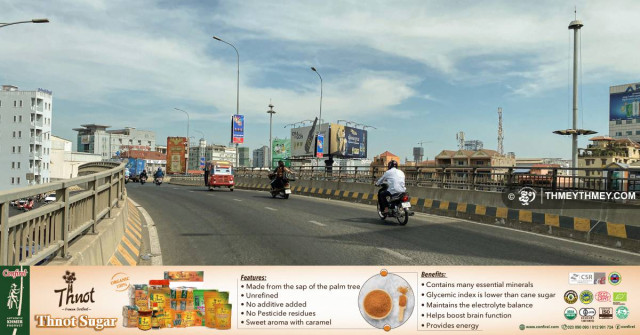Safeguard Public Health, Approve the Alcohol Control Draft Law

- By Sao Phal Niseiy
- January 17, 2024 3:25 PM
In recent weeks, there has been a lot of public debate about the promotion of alcohol. This debate has been fueled by the fact that advertisements for alcohol products seem to be reaching an alarming level.
What is particularly perturbing is that alcohol promotion has become increasingly hysterical and outrageous. Not only are alcohol products displayed on billboards and banners along busy public streets, but attractive alcohol promotions are also being carried on mainstream and social media, targeting young customers, and encouraging them to drink.
Advertising can be done in any way the beer company owners want, and this problem arises because Cambodia has not yet had a law that governs alcohol advertisements.
Beyond arbitrarily unethical advertising, the absence of alcohol control laws allows Cambodia to become a society where young people, especially minors, can buy and drink alcohol anywhere and anytime, without laws that govern and restrict it.
When it comes to regulating the promotion and use of alcohol, Cambodian public policymakers have drafted the law to control alcohol use since 2015 in response to advocacy by civil society organizations and other stakeholders. Having 11 chapters and 39 articles, its primary goal is to ensure that the regulation of all sales and use of alcohol is effective, and stricter penalties have been established to enforce this.
Initially, the provision was to set the legal age for alcohol consumption at 21 years. This move was highly appreciated as it made the country the only one in Southeast Asia with such an advanced and beneficial alcohol law that prioritized the well-being of young people. However, the age limit was later reduced to 18 years, and this decision was reached in June 2023. However, the process has still been sluggish, and almost nine years later, this important draft law has not yet been finalised, approved, and implemented to address and prevent the effects of alcohol use in Cambodian society.
The beer market in Cambodia is quite large, and many breweries in the country have been criticised for being controlled by or having relationships with the wealthy and powerful. As per a Market Research report from 2015, the beer market was worth just over $1 billion. However, it is expected to reach $2.2 billion by 2025. Due to the colossal size of the market and the significant profits from the sale of alcohol, the parties whose interests are at stake are deliberately impeding the process of enacting laws that regulate alcohol control.
Although I am not a public policy or health expert, I still feel that indulging in the promotion and consumption of alcohol without proper regulation will have far-reaching consequences for the nation in the future.
According to the World Health Organization, enforcing laws and policies through strategies to control alcohol sales and availability is the most important solution to reducing the serious impact of alcohol use.
It is crucial to limit the availability of alcohol by enforcing regulations, as this will greatly aid in safeguarding vulnerable and high-risk groups, particularly minors who are crucial for the country's future development.
Many studies have shown the serious negative effects on economic and social development, as we all know that alcohol destroys physical as well as mental health and triggers other social crises in society. These include the increase in chronic non-communicable diseases among the population, the increase in traffic accidents, domestic violence, and other social issues — all of which will be a major obstacle to national development.
In response to the public outcry, the Ministries of Information and Health have intensified their efforts to regulate alcohol consumption and advertising. Information Minister Neth Pheaktra has urged media outlets, alcohol producers, sellers, importers, and advertising companies to adhere to the ministry's code strictly. However, these measures alone may not provide a long-term solution to effectively address the issues caused by excessive alcohol use and promotion. Instead, what the country truly needs is the adoption and strict enforcement of the alcohol control law.
If we continue to ignore the importance of passing the existing draft law, it will become much more arduous to address the future social and economic consequences of alcoholism. While Cambodia may face many development issues, delaying addressing the impact of alcohol mismanagement will put Cambodia in a much more challenging and complex to do it in the future. Therefore, it is crucial for the ruling politicians to prioritise the welfare of the people and recognise that the absence of alcohol control poses a great danger to society.
They should work diligently to accelerate the process of enacting the draft law on alcohol control. It is even more important that we acknowledge that the interests of any group or individual in the alcohol industry cannot override the public interest and the well-being of the entire Cambodian people.
It is also crucial that we continue to raise awareness of the effects of alcohol powerfully and sustainably. To make this campaign succeed, the participation of many parties, including each of us as citizens, is required.
While the use or non-use of alcohol is an individual choice, influencers and public figures need to set an example and educate others. At this point, any actions that promote alcohol and affect other individuals, especially young people, should be considered and corrected.
Influencers and public figures should avoid promoting alcohol, whether directly or indirectly, and instead consider their role in raising awareness and encouraging young people to reduce alcohol consumption. By doing so, they can contribute to the promotion of public welfare and human resource development. While individuals have the right to make their own choices, it is important to make these decisions with a sense of responsibility and good conscience as a responsible citizen.















